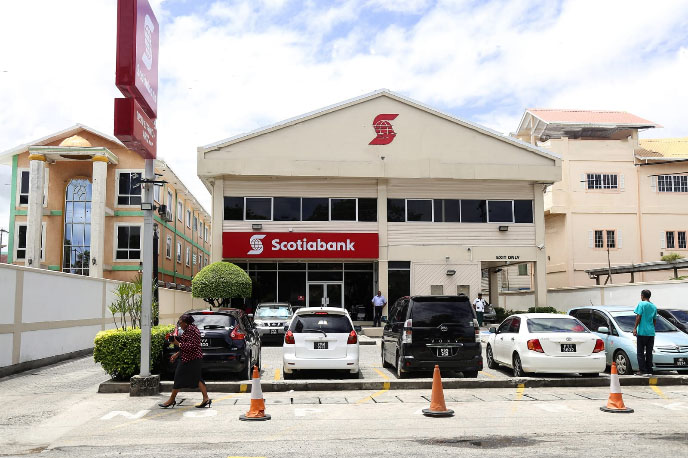The Full Court last month ruled that Scotiabank (Guyana) “negligently misdirected” $28 million paid by Core Investments Inc which was intended as the early extinguishing of a mortgage.
The bank has been ordered to apply the $28m as originally intended and in addition it has to pay Core Investments Inc $1m in damages and $1m in costs.
The judgment handed down on December 1st 2023 by Justices Navindra Singh and Priya Sewnarine-Beharry set aside the judgment of Justice Damone Younge on February 15, 2023. The Full Court was also scathing in its criticism of Scotiabank (Guyana).
The property at the centre of the litigation was owned by Justin Teixeira, who was reported to have died by suicide back in April of 2022—close to a month after striking the business deal with Core Investments Inc.

On April 23rd, 2022 Teixeira and another male, were discovered dead in a car in the Marriott Hotel parking lot at Kingston. It was later confirmed by authorities, that the two had died after ingesting sodium cyanide.
According to court documents seen by this newspaper, Core Investments Inc., located at Lot 241 Baramita Street, South Ruimveldt Gardens, had entered into an agreement of sale on March 28th, 2022 to make the purchase from Teixeira.
The property situated on parcel 293: block II: Zone East Bank Demerara; carried a price tag of $58,000,000 of which the sum of $47,000,000 was paid when the agreement was signed on the said date.
The property was encumbered by a mortgage in favour of the Bank of Nova Scotia (the Respondent) at the time of the signing of the agreement and as a result, the agreement provided for the sum of $47,000,000 to be paid in the following manner.
$28,000,000 to be paid to Scotiabank, by way of a Republic Bank (Guyana) Limited manager’s cheque for the purpose of liquidating the mortgage—and the sum of $19,000,000 to be paid to the vendor, Teixeira.
According to the case file, Core Investments (the Appellant), duly purchased the manager’s cheque in the sum of $28,000,000 from Republic Bank, payable to “Bank of Nova Scotia,” and gave it to Teixeira on the signing of the agreement.
Teixeira, the files stated, then placed that cheque into Scotia Bank’s “Express Deposit Box” the very next day after the agreement had been signed but the Respondent bank subsequently deposited the cheque into his (Teixeira’s) account.
Balance
Evidence presented before the court, revealed that on April 8th, 2022 Teixeira purchased a manager’s cheque for the sum of $50,000,000 payable to a relative and also made other withdrawals from his account, leaving a balance of $169,133 in his account.
The court in its written judgment noted Teixeira’s death by suicide on April 23rd, at the time of which his account had the balance of $169,133; while underscoring that the $28,000,000 contained in the manager’s cheque had never been applied to the mortgage on the property and as a result, the property remained encumbered to Scotia Bank.
It was on November 28th, 2022 that Core Investments applied to the High Court for, among other things, an order that Scotiabank return the $28,000,000 to it in restitution; arguing that since the cheque was not payable to Teixeira, the Respondent could not have lawfully deposited it into his account.
Scotiabank’s contention had been, however, that since it was not a party to the agreement, it was not privy to the contract and therefore was not bound by the terms of the agreement; arguing further that its duty was to its customer—Teixeira—who it said had instructed it to deposit the cheque into his account.
High Court judges Singh and Sewnarine-Beharry who heard the appeal in the Full Court, underscored that the issue which needed to be determined was whether Scotiabank could have lawfully deposited the cheque into Teixeira’s account.
The bank in its responding affidavit, the Court noted, contended that there were words written on the back of the manager’s cheque, to wit, “payee account number 312983” which it treated as instructions from Teixeira, to pay the cheque into his account.
The bank also averred that it considered the manager’s cheque to be a “crossed banker’s draft;” while going on to contend that it does not have an account in the name of “Bank of Nova Scotia;” and that it could not therefore have deposited the cheque with itself.
Analysis
In its analysis of the law, the judges noted that manager’s cheques are bills of exchange drawn by the bank’s manager in the name of the bank, against the bank itself.
They note that typically, a manager’s cheque is procured from the bank by allocating a particular amount of funds to be debited from the depositor’s account or by the depositor directly paying or depositing to the bank the value of the cheque to be drawn.
Since the bank issues the cheque in its name, with itself as the drawee, the court went on to explain that the cheque is deemed accepted in advance. “The bank issuing the cheque will guarantee payment of the cheque,” the judges said.
They went on to add that ordinarily, the cheque becomes the primary obligation of the issuing bank and constitutes its written promise to pay upon demand to the payee or the account of the payee.
This, they said, means that “if the payee of the cheque presents it for payment, the money will be paid even if there are insufficient funds in the depositor’s account at the time.”
Meanwhile, crossed cheques the judges said, are considered non-transferable as “they cannot be signed over to a third party” and the only action permitted is for the payee to deposit the cheque into an account that the payee holds in their name.
In its analysis, the Court said it does not believe that the words “payee account number 312983” purportedly written on the back of the cheque were written by Teixeira, and that a close examination of the cheque shows that the words are perfectly aligned with the bank’s stamp which is twisted on the cheque immediately below those words.
The Court pointed out that it was highly improbable that those words, purportedly written before the stamp was placed there, coincidentally lined up with the stamp or that the stamp was purportedly lined up with the words.
Notwithstanding this, the Court said it found to be ludicrous, the bank’s contention that the words on the back on the cheque were instructions from Teixeira.
The judges then went on to point out that apart from the fact that the words are in no way directive, it is a matter of fact and law that since Teixeira was not the payee named on the manager’s cheque, he could not instruct what was to be done with the cheque.
Also pointed out by the Court, was what it said was the fact that on that very day, two other manager’s cheques were cleared and deposited into Teixeira’s account and the stamp placed thereon by the Respondent bank clearly stated “deposit to the credit of A/C # 312983.
No such endorsement had been made on the manager’s cheque in issue the judges pointed out.
Regarding the issue of the “crossed banker’s draft,” the judges described the bank’s contention as “disingenuous,” stating that it ought to have been obvious to it (the bank), that the funds were intended to be credited to them whether it be Bank of Nova Scotia or Scotiabank.
The Court further went on to reason that assuming the bank did somehow honestly hold the belief that the manager’s cheque was ultimately intended to be paid to Teixeira; since it contended that it was not the named payee on the cheque, it was not open to it to endorse the cheque, which the Court pointed out is what the Respondent bank would have had to effectively do to be able to deposit the cheque into Teixeira’s account.
The Full Court said that the bank’s only option was to deposit the cheque into an account bearing the name “Bank of Nova Scotia,” and then that entity could gave the funds to Teixeira.
And since it stated very clearly that it held no account in the name of Bank of Nova Scotia, the Court said that “the only logical and judicious action” which then ought to have been taken by the Respondent, was to reject the cheque and return it to the drawer, Republic Bank.
The judges said that from the defence advanced by the Respondent, its reasoning taken to its “illogical end,” means that if the named payee on any crossed manager’s cheque did not have an account with it, then the bank would simply credit the funds of the cheque to the account of whoever placed the manager’s cheque into the bank’s express deposit box, as long as that person was a customer of the bank.
“If this is indeed the manner in which this financial institution conducts its business this is indeed worrying and ought to be inquired into by the Bank of Guyana,” the Court asserted; while going on to add, “the Respondent has failed to establish any legal or factual basis that justifies it depositing the manager’s cheque into JST’s (Teixeira’s) account.
The Court said that being a global financial institution familiar with the law and practice of the banking industry, ought to have recognised that the manager’s cheque was not being properly and lawfully processed.
The Full Court went on to lament that the Respondent, though admitting knowledge of the existence of the agreement between Core Investments and Teixeira at the time the cheque deposited, yet “inexplicably” deposited the monies into Teixeira’s account the same day that it was cleared from the deposit box, despite the fact that the cheque was for far in excess of $2 million without an accompanying declaration of the source of the funds.
The Court also rejected the bank’s argument that the contract provided that the monies were for the benefit of Teixeira, noting that by the fact of the agreement, the liquidating of the mortgage to be beneficial only to the Appellant—the purchaser of the property.
The Court said, it “finds that the Respondent negligently misdirected the payment of the manager’s cheque thereby causing loss to the Appellant.”
In the circumstances, the Full Court ordered that the monies due under mortgage No. 3858 of 2019 held by Scotiabank be calculated up to March 29th, 2022 and that the sum of $28,000,000 be credited toward such sum.
Further, it was ordered that should the sum of $28,000,000 be in excess of the sum owing on the mortgage, then such excess monies shall be paid to the Appellant. should the sum owed under the mortgage be in excess of $28,000,000 the Court has ordered that Core Investments pay such excess to the Respondent.
“It is declared that the mortgage is deemed to have been settled and repaid as per the forgoing orders. It is further ordered that when the mortgage is repaid as aforementioned, the Respondent shall forthwith cancel the said mortgage,” the court said.
The Appellant was awarded damages in the sum of $1,000,000 for negligence and court costs in the amount all of which are to be borne by the bank.
Core Investments Inc., was represented be Roysdale Forde SC, while Scotiabank was represented by attorney Kamal Ramkarran.






